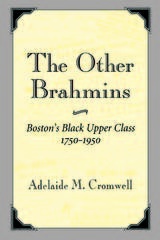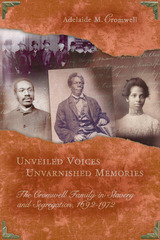When an industrious slave named Willis Hodges Cromwell earned the money to obtain liberty for his wife—who then bought freedom for him and for their children—he set in motion a family saga that resounds today. His youngest son, John Wesley Cromwell, became an educator, lawyer, and newspaper publisher—and one of the most influential men of letters in the generation that bridged Frederick Douglass and W. E. B. Du Bois. Now, in
Unveiled Voices, Unvarnished Memories, his granddaughter, Adelaide M. Cromwell, documents the journey of her family from the slave marts of Annapolis to achievements in a variety of learned professions.
John W. Cromwell began the family archives from which this book is drawn—letters and documents that provide an unprecedented view of how one black family thought, strived, and survived in American society from the seventeenth century to the twentieth. These papers reflect intimate thoughts about such topics as national and local leaders, moral behavior, color consciousness, and the challenges of everyday life in a racist society. They also convey a wealth of rich insights on the burdens that black parents’ demands for achievement placed on their children, the frequently bitter rivalries within the intellectual class of the African American community, and the negative impact on African American women of sexism in a world dominated by black men whose own hold on respect was tentative at best.
The voices gathered here give readers an inside look at the formation and networks of the African American elite, as John Cromwell forged friendships with such figures as journalist John E. Bruce and the Reverend Theophilus Gould Steward. Letters with those two faithfully depict the forces that shaped the worldview of the small but steadily expanding community of African American intellectuals who helped transform the nation’s attitudes and policies on race, and whose unguarded comments on a wide range of matters will be of particular interest to social historians. Additional correspondence between John and his son, John Jr., brings the family story into modern times.
Unveiled Voices, Unvarnished Memories is a rare look at the public and private world of individuals who refused to be circumscribed by racism and the ghetto while pursuing their own well-being. Its narrative depth breaks new ground in African American history and offers a unique primary source for that community.











